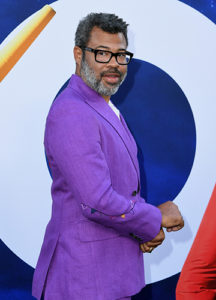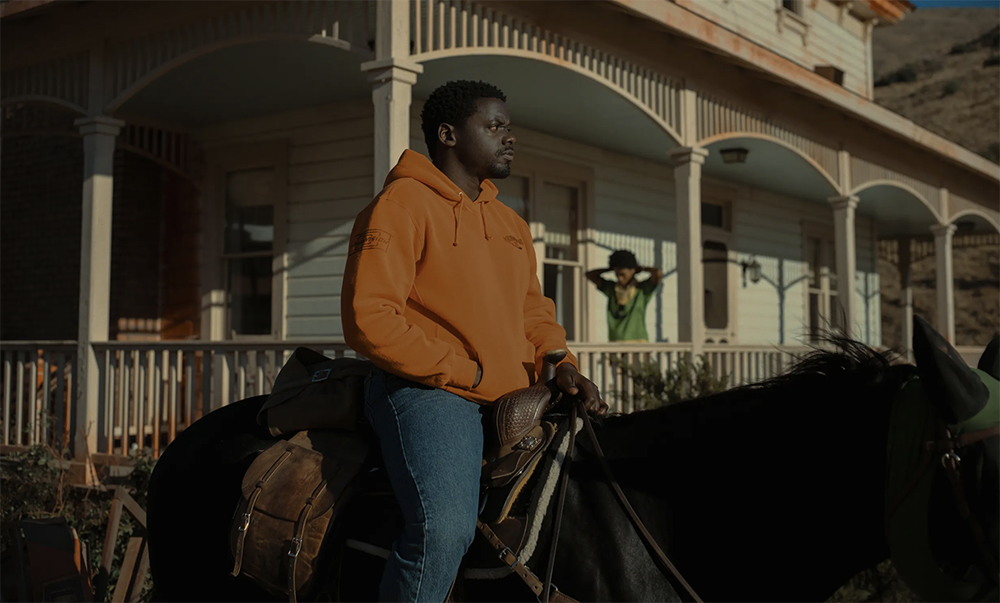Expertly combining genres including horror, sci-fi, western, and even some occasional comedy, Jordan Peele’s third film, Nope, is an effortlessly thrilling commentary on spectacle, trauma and animal abuse. Spoilers ahead.
Following intentionally-vague marketing, expectations for Peele’s follow-up to 2019’s Us were incredibly high—and rightfully so. Both the aforementioned predecessor and his directorial debut, Get Out (2017), had been met with overwhelmingly positive reviews (See The Guardian‘s review of Get Out here). The two films masterfully interwove horror elements with themes of race and class, cementing Peele among the finest upcoming directors. However, Nope stands apart from Peele’s previous projects and embraces it’s big-budget production wholeheartedly.
Nope follows siblings Otis (Daniel Kaluuya) and Emerald Haywood (Keke Palmer) as they struggle to deal with the aftermath of their father’s mysterious death. Otis throws himself into the family business of Hollywood horse-training, becoming quiet, understated and diligent in the process. Emerald leaves the ranch behind in favour of starting various businesses. Even while aiding her struggling brother on a movie set, she’s marketing herself to potential clients.
The drive to continue his father’s legacy leads Otis to sell horses to a local child-actor-turned-entrepreneur named Ricky “Jupe” Park (Steven Yeun). Park then uses the animals as bait to attract an unidentified aerial phenomenon (UAP) to his live shows. After Otis and Emerald see this vessel for the first time, they endeavour to capture it on camera, intending to sell the footage to keep business afloat. But when they realize that there’s more to the UAP than meets the eye, their circumstances change drastically.

“I will cast abominable filth at you. Make you vile. And make you a spectacle.” – Nahum 3:6
Well-demonstrated by the opening quote, Nope tackles themes of spectacle and humanity’s fascination with exploiting tragedy for economic gain.
These subjects are further exemplified in Jupe’s traumatic backstory, which involves a chimpanzee mauling on the set of a television show. Jupe was spared by the primate on account of the relationship they had formed whilst filming. However, the animal is swiftly dispatched as help arrives on the scene.
Later, we find that Jupe is selling tickets to a hidden backroom displaying merchandise and memorabilia from the show. This subplot ties remarkably into the Nope‘s main thread. Without it, the film would suffer from a lack of direction.
Such a sprawling narrative could easily bloat the length of the movie. Nevertheless, Nope manages to feel tight and compact over its two hour and ten-minute runtime.
Suggested reading: ‘Uncharted’ Film Adaptation: What are the Connections to the Games?
With cinematographer Hoyte van Hoytema producing truly spectacular imagery, Nope may be Peele’s best-looking production yet. One prominent example arrives when the UAP excretes blood over the Haywood ranch—a shot contending with the best in the genre.
The film also boasts a fantastic soundtrack composed by Peele’s frequent collaborator, Michael Abels. Darting between classic western bombast, thrill-inducing horror, and sci-fi spectacle, the score shifts to match the visuals with ease.
Nope is easily one of the most thrilling and engaging films of the year. Featuring excellent performances, horrifying visuals and an outstanding score, it slots perfectly into Jordan Peele’s ever-increasing filmography of mind-bending horror films and continues his extremely promising career. This is a must watch for fans of Peele’s previous work, horror and Steven Spielbergian adventure.

Raised on the evergreen rock gods of ‘Priest and ACDC, Max has been surrounded by music that’s hard and heavy from a young age. Music; among many other interests such as sci-fi, fantasy, sound design and herps (reptiles and amphibians), has always been a part of his life and Max is never happier than when he finds a new band to share with the world!
